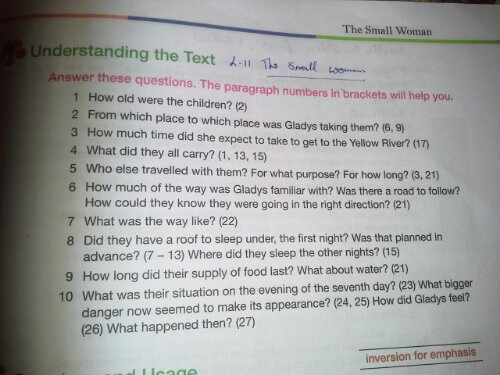Gulmohar English Reader Questions and Answers Chapter 11 : The Small Woman 1.How old were the children? Ans: They were between four and fifteen years
2.From which place to which place was Gladly taking them? Ans:From Yangcheng to Sian 3.How much time did she expect to get to the Yellow river? Ans: twelve days 4.What did they all carry? Ans: They carried millet, iron pots and bundles of bedding which included quilts 5.Who else travelled with them?For what purpose ?For how long? Ans: Two coolies sent by the Mandarin to carry millets. Till the millet was used up, which took four days. 6.How much of the way was Gladys similar with?Was there a road to follow? How could they knew that they were going in the right direction? Ans: The whole territory was new to her. It was wild and barren and she was able to find the direction only with the help of the sun. 7.What was the way like? Ans:It was wild and rough with steep slopes. There were very few places of habitation. 8.Did they have a roof to sleep under,the first night ? Was that planned in advance? Where did they sleep the other nights? Ans: Yes, fortunately they did, as a Buddhist priest offered them the temple to stay since the other brothers were away. No, it was not planned. Out in the open or under rocks. 9.How long did their supply of food last? What about water? Ans: It lasted for four days. There was practically no water after four days as they had to wait to find a village well. Unfortunately there were not many. 10.What was their situation on the evening of their seventh day? What bigger danger now seemed to make its appearance? How did Gladys feel?What happened then? Ans: They were starved and parched. When the forward scouts came with the news that there were soldiers ahead Gladys froze in panic. But to their relief, they found they were Nationalist troops. The children were delighted as they gave sweets to them.



